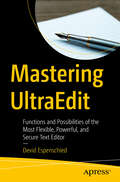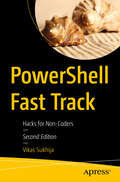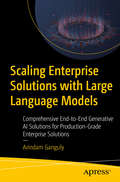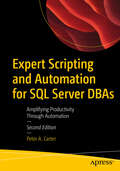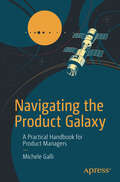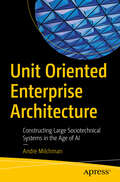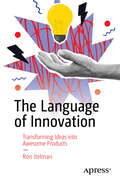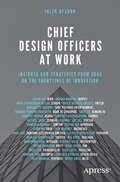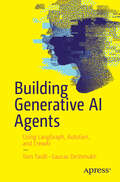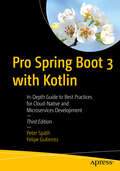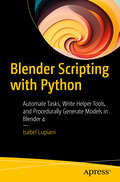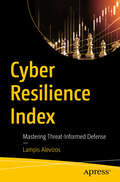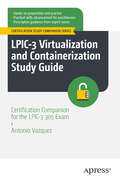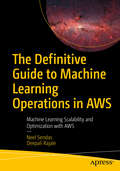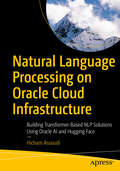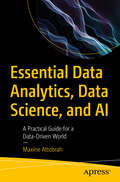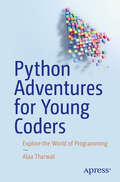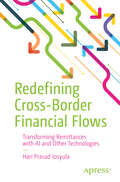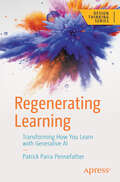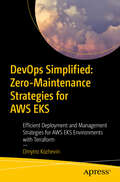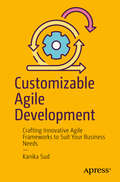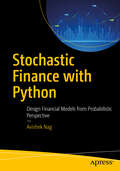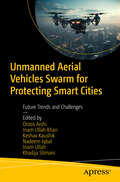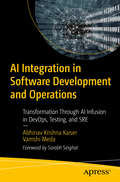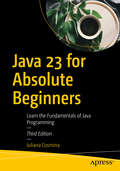- Table View
- List View
Mastering UltraEdit: Functions and Possibilities of the Most Flexible, Powerful, and Secure Text Editor
by Devid EspenschiedThis guide to UltraEdit covers the text editor's powerful and flexible functions that go far beyond the functionality of a normal text editor for a breadth of use cases, including text/code editing, web development, system administration, development/programming, remote file editing, data filtering and sorting, and file compare. Even though UltraEdit celebrated its 30th anniversary in 2024, very few manuals exist. This book provides a well-founded introduction and exhaustively discusses all UltraEdit’s powerful functions. At the same time, the book is intended to be a solid reference and a bundled compendium for the more than four million UltraEdit customers worldwide. What You Will Learn Know the basic functions and many power functions Understand the focus of UltraEdit in the areas of programming/development, web development, database management, and system administration, as well as technical writing, editing, and publishing Get up to speed on functions and capabilities, user interface and program navigation, customization and settings, and windows arrangement and file management Know the core functions for editing and inserting data Expand your knowledge with the many view variations, formatting options, and powerful search and replace features an editor can include Perfect your workflow with many other power functions such as multi-caret editing, column mode, and FTP integration Who This Book Is For Users who are familiar with text editors but are frustrated with their limits, or who want to benefit from UltraEdit's long-established power functions
PowerShell Fast Track: Hacks for Non-Coders
by Vikas SukhijaCreate complex scripts in PowerShell and learn how to connect them to cloud services like Azure and Azure AD. This updated version of the book will help you learn PowerShell by providing small “cheat” snippets that you can combine to write efficient and effective scripts. New to the book: PowerShell 5 to PowerShell 7 upgrade throughout the text New code Snippets for AWS and other technologies. New Chapter on error reporting PowerShell Fast Track starts with the basics of PowerShell before moving on to discuss functions like date and logs, along with concepts such as inputs for your scripts. Author Vikas Sukhija then walks you through interactive input and Snapins modules, where you will learn GUI button prompts and how to import sessions. He’ll then show you how to report errors through email and log errors to a text file. Reporting CSV (Comma Separate Value) is discussed next, followed by a demonstration of miscellaneous functions, including how to connect your PowerShell scripts with Azure, SharePoint, Teams and other services. As you progress further, you’ll see how PowerShell provides powerful features for automation that can be leveragedfor managing your Teams workload. Finally, using practical examples, you will learn how to implement and create scripts for day-to-day usage. After reading this book, you will be able to hit the ground running and use PowerShell’s powerful features in your own work. What You Will Learn: Utilize code Snippets to perform practical tasks Combine the code to create more complex scripts. Logging and reporting Connect to various products such as Exchange, SharePoint, Teams, and AzureAD Who This Book Is For: System administrators
Scaling Enterprise Solutions with Large Language Models: Comprehensive End-to-End Generative AI Solutions for Production-Grade Enterprise Solutions
by Arindam GangulyArtificial Intelligence (AI) is the bedrock of today's applications, propelling the field towards Artificial General Intelligence (AGI). Despite this advancement, integrating such breakthroughs into large-scale production-grade enterprise applications presents significant challenges. This book addresses these hurdles in the domain of large language models within enterprise solutions. By leveraging Big Data engineering and popular data cataloguing tools, you’ll see how to transform challenges into opportunities, emphasizing data reuse for multiple AI models across diverse domains. You’ll gain insights into large language model behavior by using tools such as LangChain and LLamaIndex to segment vast datasets intelligently. Practical considerations take precedence, guiding you on effective AI Governance and data security, especially in data-sensitive industries like banking. This enterprise-focused book takes a pragmatic approach, ensuring large language models align with broader enterprise goals. From data gathering to deployment, it emphasizes the use of low code AI workflow tools for efficiency. Addressing the challenges of handling large volumes of data, the book provides insights into constructing robust Big Data pipelines tailored for Generative AI applications. Scaling Enterprise Solutions with Large Language Models will lead you through the Generative AI application lifecycle and provide the practical knowledge to deploy efficient Generative AI solutions for your business. What You Will Learn Examine the various phases of an AI Enterprise Applications implementation. Turn from AI engineer or Data Science to an Intelligent Enterprise Architect. Explore the seamless integration of AI in Big Data Pipelines. Manage pivotal elements surrounding model development, ensuring a comprehensive understanding of the complete application lifecycle. Plan and implement end-to-end large-scale enterprise AI applications with confidence. Who This Book Is For Enterprise Architects, Technical Architects, Project Managers and Senior Developers.
Expert Scripting and Automation for SQL Server DBAs: Amplifying Productivity Through Automation
by Peter A. CarterThe market is trending toward a much smaller ratio of DBAs to SQL Server instances, but this book will help you meet this new reality by harnessing automation to continue building and maintaining reliable database platform services for your SQL Server enterprise. The book will help you automate your workload and manage more databases and instances with greater ease and efficiency by combining metadata-driven automation with the power of PowerShell. You'll soon be able to automate your new instance-builds and centralize your maintenance. This book walks you through automating the SQL Server build processes and maintenance of multiple instances from a single location, as well as how to use database metadata to drive your automation. With a heavier focus on PowerShell, this 2nd edition highlights modern techniques, such as configuration management. Also new in this edition, you will learn how to use PowerShell modules such as SqlServer and DBATools, which is a popular community module that you can rely on to keep your database estate running smoothly. You will understand the benefits of centralizing maintenance to better keep your enterprise responding with reliable performance to the loads placed upon it by your business. The book helps you become faster and better at what you do for a living, and thus will boost your value within the job market. What You Will Learn Automate SQL Server installation and configuration Apply techniques such as Desired State Configuration to prevent drift on your servers and instances Increase your value to your organization by automating low-value tasks and focusing your time on the higher-value ones Take advantage of database metadata to drive automation, allowing you to build intelligent automated routines Promote and demonstrate how to modernize database maintenance across your enterprise Apply tools such as PowerShell with modern techniques to increase your value in the job market Who This Book Is For SQL Server DBAs who want to increase their productivity by embracing automation
Navigating the Product Galaxy: A Practical Handbook for Product Managers
by Michele GalliAs companies want to innovate and stay competitive, product managers must be capable of understanding new market demands, leveraging technology, and aligning product strategies with business goals. This book is designed for both aspiring and seasoned product managers covering the entire product management lifecycle, from ideation and user research to development, to launch, and continuous improvement. In today’s technology-driven market, the role of a product manager has never been more crucial. This book emphasizes practical applications and real-world examples, offering actionable insights and addresses the evolving world of product management, including the impact of new technologies and methodologies. By blending theory with practice, Navigating the Product Galaxy provides you with the tools they need to succeed in a dynamic environment. What You Will Learn Create an inspiring vision and strategic roadmap. Leverage user research and product metrics. Understand the best approaches to plan, launch, and iterate on your product. Generate growth and improve conversion rates. Apply methods for continuous learning and staying ahead in the industry Who This Book Is For Product Managers both new to the field and those more experienced who are looking to consolidate their skills; Developers and engineers who are looking to know more about product management lifecycles; Managers and start up entrepreneurs who are looking to know more about product management and deployment for early business success.
Unit Oriented Enterprise Architecture: Constructing Large Sociotechnical Systems in the Age of AI
by Andre MilchmanExamine a new approach to Enterprise Architecture (EA) that challenges conventional practices and supports a transformative shift to address the demands of a rapidly evolving technological landscape. This book offers alternatives to traditional EA methods that often divide the enterprise into isolated business, application, data, and technology architectures, often resulting in disjointed operations and missed opportunities for innovation. By proposing an innovative, purpose-driven architectural style, this book emphasizes the need for a cohesive and adaptive framework that aligns all components of an enterprise with its strategic goals. Key concepts explored include the integration of social and technical elements in building large sociotechnical systems, the introduction of Unit Oriented Enterprise Architecture (UOEA) for modular and adaptable enterprise design, and the importance of Purpose Driven Design (PDD) in ensuring operational efficiency and strategic alignment. You’ll also gain insights into organizing software engineering in the cloud era, streamlining enterprise interactions, and embracing creative destruction to foster technological harmony. Unit Oriented Enterprise Architecture is your essential resource for system architects, organizational leaders, IT professionals, and students seeking to revolutionize their approach to enterprise architecture and position their organizations for success in the digital age. What You Will Learn Critically assess and dismantle outdated EA concepts to create a more adaptive and cohesive architectural framework. Explore how UOEA can enhance agility and adaptability, allowing your organization to respond more effectively to change. Organize and manage software development within cloud infrastructures, ensuring clarity, scalability, and alignment with your architectural framework. Who This Book Is For Primary Audience: Enterprise architects, organizational leaders, IT professionals; Secondary Audience: Consultants, advisors, and policymakers; Tertiary Audience: Students in system design and organizational studies, academic researchers
The Language of Innovation: Transforming Ideas into Awesome Products
by Ron ItelmanTransform how teams innovate together and turn your ideas into scalable solutions through practical implementation techniques. Drawing from real-world successes and failures at companies like Apple, Toyota, and Amazon, this book provides a visual language and framework that helps teams align their efforts and reduce risks. Do you struggle to turn creative ideas into reality? Are your innovation projects moving slower than you'd like? Innovation thrives on collaboration, but without the right tools and principles, even brilliant ideas can falter. Through captivating stories and clear frameworks, learn how to create alignment across teams and stakeholders to help make confident strategic choices that minimize risk. You’ll also identify and solve innovation bottlenecks, build systems that scale innovation success, and measure what matters for sustainable growth Whether you're a startup founder, corporate innovator, or team leader, The Language of Innovation equips you with practical tools you can implement immediately using just a whiteboard or spreadsheet. Master the proven principles that help organizations like Amazon turn simple ideas into billion-dollar innovations. What You Will Learn Master the four types of innovation (Process, Business Model, Product, Marketing) and how to apply them effectively Develop systems thinking approaches to understand and improve organizational processes Create effective innovation strategies using proven frameworks and tools Build alignment across teams and stakeholders to drive successful innovation Measure and validate innovation success using data-driven methods Who This Book is For Innovation leaders, product developers, entrepreneurs, and business strategists who need practical frameworks to turn ideas into reality; project managers, business analysts, and cross-functional team leaders who must navigate complex organizational challenges while delivering results; MBA students and business educators interested in understanding real-world innovation dynamics.
Chief Design Officers at Work: Insights and Strategies from CDOs on the Frontlines of Innovation
by Jaleh AfsharMeet the creative minds shaping our world in Chief Design Officers At Work, the captivating new addition to the acclaimed At Work series from Apress. Explore the realm of design management, unveiling unique perspectives, strategies, and innovative approaches to building businesses with design in mind. Through a collection of insightful interviews, gain an illuminating glimpse into the daily lives, challenges, and triumphs of prominent design executives from various industries, spanning zero-to-one products to established brands. Each of these design experts have played a pivotal role in shaping design-driven approaches, leading to groundbreaking industry evolutions and market disruption. The remarkable stories and insights from these visionaries reveal how design-led thinking can be a powerful catalyst for driving bottom line success. From building user-centric products to creating cohesive brand experiences, these design leaders demonstrate the transformative impact design can have on business outcomes. Readers who are design practitioners, launching their own startup, revitalizing an existing product, or established executives will find invaluable lessons and inspiration within these pages. What You Will Learn How design leaders navigate complex business landscapes to craft compelling user experiences and brand strategies Valuable insights and practical advice that can elevate their own practice How to make a lasting impact in your industry as a designer Who This Book is For Whether you're a seasoned executive seeking fresh inspiration or an aspiring design practitioner eager to glean wisdom from the best in the field, Chief Design Officers at Work is an indispensable guide for anyone in the design field.
Building Generative AI Agents: Using LangGraph, AutoGen, and CrewAI
by Tom Taulli Gaurav DeshmukhThe dawn of AI agents is upon us. Tech visionaries like Bill Gates, Andrew Ng, and Vinod Khosla have highlighted the monumental potential of this powerful technology. This book will provide the knowledge and tools necessary to build generative AI agents using the most popular frameworks, such as AutoGen, LangChain, LangGraph, CrewAI, and Haystack. Recent breakthroughs in large language models have opened up unprecedented possibilities. After years of gradual progress in machine learning and deep learning, we are now witnessing novel approaches capable of understanding, reasoning, and generating content in ways that promise to revolutionize nearly every industry. This platform shift is as significant as the advent of mainframes, PCs, cloud computing, mobile technology, and social media. It’s why the world’s largest technology companies – like Microsoft, Apple, Google, and Meta – are making enormous investments in this category. While chatbots like ChatGPT, Claude, and Gemini have demonstrated remarkable potential, the years ahead will see the rise of generative AI agents capable of executing complex tasks on behalf of users. These agents already exhibit capabilities such as running test suites, searching the web for documentation, writing software, answering questions based on vast organized information, and performing intricate web-based tasks across multiple domains. They can autonomously investigate cybersecurity incidents and address complex customer support needs. By integrating skills, knowledge bases, planning frameworks, memory, and feedback loops, these systems can handle many tasks and improve over time. Building Generative AI Agents serves as a high-quality guide for developers to understand when and where AI agents can be useful, their advantages and disadvantages, and practical advice on designing, building, deploying, and monitoring them. What You Will Learn The foundational concepts, capabilities, and potential of AI agents. Recent innovations in large language models that have enabled the development of AI agents. How to build AI agents for launching a product, creating a financial plan, handling customer service, and using Retrieval Augmented Generation (RAG). Essential frameworks for building generative AI agents, including AutoGen, LangChain, LangGraph, CrewAI, and Haystack. Step-by-step guidance on designing, building, and deploying AI agents. Insights into the future of AI agents and their potential impact on various industries. Who This Book Is For Experienced software developers
Pro Spring Boot 3 with Kotlin: In-Depth Guide to Best Practices for Cloud-Native and Microservices Development
by Felipe Gutierrez Peter SpäthQuickly and productively build complex Kotlin-based Spring applications and microservices out of the box, with minimal concern over things such as configurations. This revised edition will show you how to fully leverage the Spring Boot 3 micro-framework and apply it to create enterprise-ready Kotlin-based cloud-native applications, microservices, and web applications that just work. The book covers what has been added to the new Spring Boot 3 release, including improved support for the Kotlin programming language, changes to Stream Editor UI, Maven Preemptive Authentication, building Docker images using cloud-native build packs, building layered jars for optimized Docker images, E2E traceability for configuration properties, many dependency upgrades, support for Spring Data, and much more. This book is your in-depth pragmatic guide for increasing your enterprise Kotlin and cloud application productivity while decreasing development time. It is a no-nonsense guide with case studies of increasing complexity throughout the book. The main author, a senior solutions architect and Principal Technical instructor at Pivotal, the company behind the Spring Framework, shares his experience, insights, and first-hand knowledge about how Spring Boot technology works, and best practices. This is an essential book for your Kotlin-based Spring learning and reference library. What You Will Learn Build cloud-native apps and microservices with the Spring Boot 3 framework Persist and access your data using and integrating with Spring Data Message with Kafka, RabbitMQ, and WebSockets Explore Spring Cloud projects Extend Spring Boot by creating your own Spring Boot Starter and @Enable feature Test and deploy Spring Boot with best practices Effectively use Kotlin as a programming language for Spring applications Who This Book Is For Experienced Spring, Java, and Kotlin developers seeking increased productivity gains and decreased complexity and development time in their applications and software services
Blender Scripting with Python: Automate Tasks, Write Helper Tools, and Procedurally Generate Models in Blender 4
by Isabel LupianiLearn to automate tasks, develop custom extensions, and procedurally generate meshes in Blender. This book will show you how to streamline virtually every stage of the 3D modeling pipeline for your next game or animation project. Start with a hands-on introduction to the Blender Python API and dive right into basics like loading/running scripts and turning hand-modelling steps into Python by capturing them in the Info Editor. Then experiment with Blender menu options, typing them into the Python console and watch things move in the viewport. You’ll also dissect with Blender-shipped add-ons and take advantage of built-in templates to quickly create new scripts. With a firm grasp of scripting basics, you'll start to develop your own add-ons for editing and generating models. Then add more advanced mesh edits like extrude and loop cut-and-slides to your script, and essentials for shaping mesh elements like merge, bevel, and so on. Putting it altogether, you’ll create an extension to procedurally generate stylized fire hydrants with parametric controls. In addition to mesh editing, you’ll learn to develop production-quality extensions covering various stages of a 3D pipeline, such as retopology, UV mapping, texture painting, and more. Discover along the way how to implement just about any input widgets for your extension. Then package, distribute, and market your extensions through different channels, and produce impressive time-lapsed demos to showcase your procedural content generation (PCG) algorithms. Whether you are new to the Blender Python API or looking to take your add-ons to the next level, this book will support you in your journey in generating 3D content and automating your Blender workflow. What You Will Learn ● Develop add-ons for automating various stages of a 3D modeling pipeline ● Edit meshes with the Blender Python API and procedurally generate models. ● Master use of parametric controls in add-ons for mesh editing or procedural generation to govern the ranges and types of variation produced ● Develop extensions complete with UI using various input methods, including drawing on meshes with the Grease Pencil. ● Make time-lapsed and interactive demos of your procedural content generation algorithms. ● Package, distribute, and market your Blender extensions through different channels. Who This Book Is For New and seasoned users of the Blender Python API, that have either some experience with Blender or some experience with general Python development.
Cyber Resilience Index: Mastering Threat-Informed Defense
by Dr. Lampis AlevizosImagine quantifying and visualizing your organization's cyber resilience as precisely as a stock market index. This book introduces that reality through the innovative Cyber Resilience Index, a unified metric that helps master threat-informed defense, transform cybersecurity strategy, and achieve efficient and effective threat management and communication. Through an engaging dialogue between a seasoned CISO Sophia and an innovative security leader Alex, you are taken on a journey from traditional, reactive defense to a proactive, resilience-focused strategy. The book masterfully blends technical depth with strategic insights, explaining the paradigm shift from asset-driven to threat-intelligence-driven security. You will learn how and why compliance is very important, but not enough to be truly cyber resilient; how to construct and leverage interoperable cyber value chains; how to go beyond continuous threat exposure management programs and truly master the threat-informed defense concepts; how to articulate value, and manage your cyber defense through a unified metric (much like traders use stock market charts to make successful trading decisions); and, lastly, what the evolution of cybersecurity leadership looks like ahead. Whether you're a cybersecurity professional, a subject matter expert (SME), a business leader, a security leader, or an expert in the field looking for battle-tested ways to sharpen or develop your leadership skills, this book provides a new lens through which to view the future of cybersecurity and leadership. Are you ready to reshape the chessboard of cyber defense? What You Will Learn Quantify and visualize your organization's cyber resilience using a unified metric Transition from reactive defense to proactive, threat-informed strategy Build and optimize interoperable cyber value chains Articulate cybersecurity value to boards and executives Evolve beyond compliance-driven security to true cyber resilience Make data-driven cybersecurity decisions using the Cyber Resilience Index Anticipate and counter emerging cyber threats Transform your security operations into a well-oiled, efficient machine Engage in hands-on experience through practical exercises at the end of each chapter, laying groundwork for mastering threat-informed defense Develop essential soft skills for cybersecurity leaders, illustrated through philosophical quotes and real-world experiences Communicate strategies crucial for successful cybersecurity transformation Obtain leadership skills necessary to drive change in complex organizational environments Gain career development insights for SMEs aspiring to become the next generation of cybersecurity leaders Measure and manage defenses more efficiently than traditional risk management, and outdated risk matrices and risk registers Balance technical expertise with a strategic business mindset in cybersecurity leadership Strategize for what lies ahead in the development of the cyber resilience index, namely, integrating AI and machine learning towards the formation of an AI-driven cyber value chain Who This Book Is For CISOs and emerging leaders who want to sharpen their strategic edge; technical experts looking to grow into the leadership ladder; board members and executives who need to grasp cybersecurity at a strategic level; IT and security managers searching for fresh, data-driven and threat-informed approaches to fortify their defenses; and consultants who wish to gain cutting-edge insights to elevate their client offerings. Whether you're a veteran in the field, a curious academic, or a student of cybersecurity, this book provides a transformative view on the future of cyber defense, threat management, and cybersecurity leadership
LPIC-3 Virtualization and Containerization Study Guide: Certification Companion for the LPIC-3 305 Exam (Certification Study Companion Series)
by Antonio VazquezGet up to speed on the key topics required for the Linux Professional Institute's LPIC-3 305 exam, the third in the four-part LPIC-3 certification, which covers virtualization and containerization. The wider LPIC-3 certification helps developers and system administrators become experts in a given context of Linux and Open Source solutions. This study companion is designed to sit alongside your studies and certification guides as you prepare for the exam and will take you through the three main areas of Full Virtualization, Container Virtualization as well as VM Deployment and Provisioning. We will undertake a deep dive of all the major topics, from the basics of virtualizations and containers to in-depth breakdown of virtualization solutions like KVN, Xen and Proxmox as well as popular containers like Docker, Kubernetes, Openstack, Terraform, Packer, Vagrant and others with key concepts covered on the exam called out and applied in each chapter of this book, giving you both practice and reinforcement, a far more effective learning tool than rote learning or similar approaches typically enlisted in exam preparation. LPIC-3 Virtualization and Containerization Study Guide will give you the guidance and support as you take the next exciting step in supercharging your Linux skills and knowledge to take the next step in your professional career. You Will: Gain a clear picture about the different types of virtualization in use today. Understand how to work with virtualization solutions like KVM and Xen, and manage them using the libvirt API. Become aware of the use of fully enterprise-ready virtualization solutions like Proxmox. Learn the technologies that make Open Source virtualization, possible This is for: Developers and more seasoned Linux SysAdmins who are working towards the LPIC-3 certification. It would be expected that readers will meet the requirements of taking the exam which includes having passed the LPIC-2 certification. However, this guide will also be of use to Linux professionals who are not currently pursuing certification but wish to expand and refresh their Linux skills in relation to virtualization and containerization.
The Definitive Guide to Machine Learning Operations in AWS: Machine Learning Scalability and Optimization with AWS
by Neel Sendas Deepali RajaleForeword by Dr. Shreyas Subramanian, Principal Data Scientist, Amazon This book focuses on deploying, testing, monitoring, and automating ML systems in production. It covers AWS MLOps tools like Amazon SageMaker, Data Wrangler, and AWS Feature Store, along with best practices for operating ML systems on AWS. This book explains how to design, develop, and deploy ML workloads at scale using AWS cloud's well-architected pillars. It starts with an introduction to AWS services and MLOps tools, setting up the MLOps environment. It covers operational excellence, including CI/CD pipelines and Infrastructure as code. Security in MLOps, data privacy, IAM, and reliability with automated testing are discussed. Performance efficiency and cost optimization, like Right-sizing ML resources, are explored. The book concludes with MLOps best practices, MLOPS for GenAI, emerging trends, and future developments in MLOps By the end, readers will learn operating ML workloads on the AWS cloud. This book suits software developers, ML engineers, DevOps engineers, architects, and team leaders aspiring to be MLOps professionals on AWS. What you will learn: ● Create repeatable training workflows to accelerate model development ● Catalog ML artifacts centrally for model reproducibility and governance ● Integrate ML workflows with CI/CD pipelines for faster time to production ● Continuously monitor data and models in production to maintain quality ● Optimize model deployment for performance and cost Who this book is for: This book suits ML engineers, DevOps engineers, software developers, architects, and team leaders aspiring to be MLOps professionals on AWS.
Natural Language Processing on Oracle Cloud Infrastructure: Building Transformer-Based NLP Solutions Using Oracle AI and Hugging Face
by Hicham AssoudiThis book demonstrates how to use Oracle Cloud Infrastructure (OCI) and Hugging Face technologies to develop advanced NLP solutions. Through a practical case study, it addresses common NLP challenges and offers strategies for creating efficient, cost-effective transformer-based models. By the end of this book, you will have the skills and knowledge to create cutting-edge NLP solutions on OCI, customized to meet the needs of various industries and projects. The book takes you through the complete NLP solution life cycle—covering data preparation, model fine-tuning, deployment, and monitoring—while highlighting key topics such as cost-effectiveness and responsible AI for NLP implementations. Drawing from real-world experience and offering practical insights, it bridges the gap between theory and practice, equipping you to design and deploy scalable, cost-efficient NLP solutions. What You Will Learn Master key NLP concepts and the OCI ecosystem Create high-quality datasets using Hugging Face and OCI Data Labeling Service Fine-tune domain-specific pre-trained models from Hugging Face using OCI Data Science Notebook Sessions Deploy and operationalize your models with OCI Data Science Model Deployments Automate the NLP life cycle with OCI Data Science Pipelines Implement cost-effective strategies throughout the entire NLP life cycle, from dataset preparation to model training and deployment Who This Book Is For A diverse audience interested in implementing NLP solutions on Oracle Cloud Infrastructure: NLP practitioners, data scientists, and machine learning engineers who want to learn how to leverage Oracle AI and Hugging Face to implement an end-to-end NLP solution life cycle, from data preparation to model deployment; Oracle practitioners who want to expand their Oracle expertise by exploring OCI's advanced capabilities for building and scaling cutting-edge NLP solutions in enterprise environments; business decision makers who want to discover the strategic benefits of NLP solutions on OCI, including cost-effectiveness and responsible AI, while driving business value
Essential Data Analytics, Data Science, and AI: A Practical Guide for a Data-Driven World
by Maxine AttobrahIn today’s world, understanding data analytics, data science, and artificial intelligence is not just an advantage but a necessity. This book is your thorough guide to learning these innovative fields, designed to make the learning practical and engaging.The book starts by introducing data analytics, data science, and artificial intelligence. It illustrates real-world applications, and, it addresses the ethical considerations tied to AI. It also explores ways to gain data for practice and real-world scenarios, including the concept of synthetic data. Next, it uncovers Extract, Transform, Load (ETL) processes and explains how to implement them using Python. Further, it covers artificial intelligence and the pivotal role played by machine learning models. It explains feature engineering, the distinction between algorithms and models, and how to harness their power to make predictions. Moving forward, it discusses how to assess machine learning models after their creation, with insights into various evaluation techniques. It emphasizes the crucial aspects of model deployment, including the pros and cons of on-device versus cloud-based solutions. It concludes with real-world examples and encourages embracing AI while dispelling fears, and fostering an appreciation for the transformative potential of these technologies.Whether you’re a beginner or an experienced professional, this book offers valuable insights that will expand your horizons in the world of data and AI.What you will learn:What are Synthetic data and Telemetry dataHow to analyze data using programming languages like Python and Tableau.What is feature engineeringWhat are the practical Implications of Artificial IntelligenceWho this book is for:Data analysts, scientists, and engineers seeking to enhance their skills, explore advanced concepts, and stay up-to-date with ethics. Business leaders and decision-makers across industries are interested in understanding the transformative potential and ethical implications of data analytics and AI in their organizations.
Python Adventures for Young Coders: Explore the World of Programming
by Alaa TharwatThis book takes young readers on an exciting adventure with a child named Kai. One day, Kai wakes up trapped inside a giant robot. He can't talk to anyone outside, and the only way to communicate is through the robot. Inside the robot, Kai finds many books and documents written in a strange language—it's the robot's language, which is Python. Kai realizes he needs to learn this language to control the robot and talk to the outside world. In each chapter in this book, we will join Kai on a new adventure to learn something that helps us control the robot better and communicate with the real world. This fun and interactive book is designed to introduce young minds to the basics of programming while encouraging creativity and problem-solving skills. In the introductory chapters, readers discover Python as a friendly and accessible programming language. The book guides them through setting up their programming environment and crafting their initial lines of code, laying the foundation for an exciting coding adventure. As the exploration unfolds, it delves into fundamental programming concepts essential for any budding coder. From variables and data types to loops and conditionals, these building blocks empower readers to create their programs, fostering a solid understanding of the core principles of coding. It seamlessly integrates these concepts with previously learned fundamentals, providing a comprehensive view of Python's capabilities. Fueling creativity, it inspires readers to unleash their imagination through engaging projects. From crafting games to developing useful applications, young coders learn to apply their programming skills in innovative ways, transforming abstract coding concepts into real and interactive projects. With a focus on accessibility, engagement, and real-world application, this book paves the way for the next generation of Python enthusiasts. What you will learn: Understand Python programming fundamentals, including syntax, variables, data types, loops, conditionals, lists, functions, and handling files. Learn to break down complex problems into smaller, manageable tasks and apply coding concepts to find creative solutions. How to create their interactive coding projects using Python. Understand strategies for debugging and troubleshooting common programming problems, which are essential skills for any programmer Who this book is for: This book caters primarily for high school students and individuals keen on delving into programming with minimal or zero coding background. It's structured to be both accessible and captivating for young readers, immersing them in the realm of coding through entertaining and interactive journeys. Moreover, it extends its reach to educators and coding enthusiasts alike.
Redefining Cross-Border Financial Flows: Transforming Remittances with AI and Other Technologies
by Hari Prasad JosyulaAnalyse how AI and other cutting-edge technologies affect the complex web of international financial transactions. The global remittance sector and artificial intelligence (AI) work together in a way that is testament to the revolutionary force of innovation in the always changing financial and technology landscape. As we stand at the threshold of a new age, this book aims to explore the layers of complexity underlying the confluence of AI and remittances. Your investigation will go beyond the current state of affairs and into the future, whereby predictive analytics and autonomous financial transactions will fundamentally alter the way that we send and receive money internationally. This process's incorporation of AI technology represents a revolution rather than a simple progression, one that might improve millions of people's lives by streamlining, securing, and lowering the cost of financial transactions. This book breaks down the complex workings of AI prediction models, reveals how blockchain integration may be used to facilitate safe and transparent transactions, and examines how biometric authentication can strengthen the security of financial transactions. It dives into the complexities of regulatory compliance, understanding the difficult balance between innovation and conformity to existing standards. When machines carry out transactions based on complex algorithms and current market circumstances, what does it entail for people and economies? What effect does this change have on how people make financial decisions? This book is an invitation to imagine a future in which financial systems are not just efficient but also naturally intelligent. It is a call to reflect on the moral ramifications, the effects on society, and the obligations that accompany the dawn of a new era of financial opportunity. Remittances are about to undergo a revolution, and you have a crucial role to play in determining how this will play out. What You’ll Learn Understand the integration of AI and other technology in remittances to enhance efficiency, security, and cost-effectiveness of cross-border financial transactions. Examine the impact of AI-driven cross border flows on global economic development, particularly in communities heavily reliant on remittances. Investigate the social benefits and potential challenges posed by AI in maintaining or altering familial and community ties through remittance flows Critically evaluate regulatory and ethical challenges while fostering innovation and adhering to existing financial laws and standards. Explore future scenarios where AI governs autonomous financial transactions and the role of humans in an AI-driven financial ecosystem. Debate how such changes might redefine personal and communal financial interactions. Who This Book Is For FinTech practitioners, Finance students, professionals in working in Payments and/or Remittances
Regenerating Learning: Transforming How You Learn with Generative AI (Design Thinking)
by Patrick Parra PennefatherThe perfect storm of learning provoked by generative AI is not just about learning how to use the technology to change human patterns of work and life. The technologies are re-orienting how we think we learn, what we learn, what we need to learn, when and where we learn about knowledge production, how humans communicate with each other, the economic, social, political, creative, ethical and technological factors that inform how we navigate human influenced existence on this planet. The technology empowers you to reimagine and reinvent how you learn while doing your work. Just like you can regenerate content persistently using generative AI systems, so too can you regenerate what and how you learn. Regenerating Learning will help guide the small team you are a part of, or influence leadership to leverage generative AI systems responsibly. Besides pointing to all the more obvious benefits of learning how to use generative AI systems more effectively, this book provides use cases, research and educational theory to propose that interacting with the technology leads to a number of unanticipated learning outcomes. These outcomes challenge the very way in which we have come to learn, what we have learned, and what we may need to unlearn. As generative AI becomes increasingly integrated within workplace environments at some point or other we will each need to decide if we are going to use the technology and how. What You will Learn • Methods and techniques to re-learn how you learn through your interactions with different generative AI. • Strategic approaches to integrate generative AI within your workflows. • How to iterate, adapt, prototype and learn continuously with generative AI. • A variety of tools and approaches to reconcile your organization’s use of generative AI. • How to develop a road map towards the integration of AI systems within your organization. Who this Book Is For Creatives, team leaders, managers and leadership in different organizations; teams in collaborative and creative industries; managers and employees in organizational learning
DevOps Simplified: Efficient Deployment and Management Strategies for AWS EKS Environments with Terraform
by Dmytro KozhevinGain the knowledge and practical skills needed to deploy a fully functional, secure, and scalable application in AWS EKS. This book is a hands-on guide designed to help you navigate and manage infrastructure in the AWS EKS environment. The book starts by reviewing the concept of DevOps flexibility, emphasizing adaptability to manage changes effectively. It covers foundational elements like IAM basics, user management, and the use of Terraform for infrastructure as code, highlighting the importance of version stability and unique CIDR blocks. Moving forward, you’ll explore Kubernetes, and its initial set-up steps, such as configuration management, access control, and storage. You’ll also see how to bridge Kubernetes with AWS resources, touching upon service accounts, identity federation, and policy assignment. In the final chapters, the book guides you through the complete setup of a fully working application using Terraform. The book culminates with a step-by-step walkthrough of deploying a complete application environment where you’ll generate and distribute access credentials, configure persistent storage, and manage RBAC for users, all using Terraform. Zero-Maintenance Strategies for AWS EKS will provide you with a solid foundation and a toolkit of proven strategies for managing cloud infrastructure. What You Will Learn Understand the concept of DevOps flexibility and its practical applications Acquire foundational knowledge in IAM basics and user management. Manage external access to your applications while consolidating load balancing through a single, entry point. Securely configure DNS and SSL, ensuring your application is both accessible and protected. Who This Book Is For DevOps professionals, IT managers, and software developers who are looking to adopt or improve their DevOps practices, and students and educators in IT-related fields.
Customizable Agile Development: Crafting Innovative Agile Frameworks to Suit Your Business Needs
by Kanika SudThe one-size-fits-all approach to Agile project management doesn't always fit an organization's needs. This book seeks to highlight the importance of experimentation and customization in modern project management practices. In an era of digital transformation and rapid disruption, organizations must continuously strive to innovate and tailor their methodologies in order to thrive. You'll start by looking at key fundamentals and challenges, setting an agile mindset to then explore the basics of Agile, Scrum, Kanban, and Lean. Aided by practical examples and real-world case studies. you'll then move onto the more practical part of the book and can create customizable Agile frameworks using innovative practices and hybrid models to suit individual needs. With Customizable Agile Development as your guide, you'll be confident in how to adapt and create agile methodologies and frameworks that truly fit your requirements and needs. What You Will Learn Adapt Agile practices to their specific industry and context. Foster a culture of experimentation and continuous improvement. Create Agile frameworks that optimize efficiency and value delivery. Harness Agile methodologies to stay ahead in a rapidly changing world. Who This Book Is For Agile coaches and practitioners as well as product managers and strategy advisors
Stochastic Finance with Python: Design Financial Models from Probabilistic Perspective
by Avishek NagJourney through the world of stochastic finance from learning theory, underlying models, and derivations of financial models (stocks, options, portfolios) to the almost production-ready Python components under cover of stochastic finance. This book will show you the techniques to estimate potential financial outcomes using stochastic processes implemented with Python. The book starts by reviewing financial concepts, such as analyzing different asset types like stocks, options, and portfolios. It then delves into the crux of stochastic finance, providing a glimpse into the probabilistic nature of financial markets. You’ll look closely at probability theory, random variables, Monte Carlo simulation, and stochastic processes to cover the prerequisites from the applied perspective. Then explore random walks and Brownian motion, essential in understanding financial market dynamics. You’ll get a glimpse of two vital modelling tools used throughout the book - stochastic calculus and stochastic differential equations (SDE). Advanced topics like modeling jump processes and estimating their parameters by Fourier-transform-based density recovery methods can be intriguing to those interested in full-numerical solutions of probability models. Moving forward, the book covers options, including the famous Black-Scholes model, dissecting it from both risk-neutral probability and PDE perspectives. A chapter at the end also covers the discovery of portfolio theory, beginning with mean-variance analysis and advancing to portfolio simulation and the efficient frontier. What You Will Learn Understand applied probability and statistics with finance Design forecasting models of the stock price with the stochastic process, Monte-Carlo simulation. Option price estimation with both risk-neutral probabilistic and PDE-driven approach. Use Object-oriented Python to design financial models with reusability. Who This Book Is For Data scientists, quantitative researchers and practitioners, software engineers and AI architects interested in quantitative finance
Unmanned Aerial Vehicles Swarm for Protecting Smart Cities: Future Trends and Challenges
by Keshav Kaushik Inam Ullah Khan Inam Ullah Oroos Arshi Nadeem Iqbal Khadija SlimaniExplore the intersection between unmanned aerial vehicles (UAVs) and the evolving landscape of smart cities. With the increasing integration of technology into urban environments, there is a growing need to understand how UAV swarms can contribute to the safety, efficiency, and resilience of these complex urban ecosystems. The book aims to provide a technical understanding of UAV swarms and their applications within the context of smart cities. It begins by laying the groundwork with an introduction to UAV swarms and smart cities, establishing the foundational concepts and motivations behind their integration. As the book progresses, it delves into various aspects of smart cities, exploring concepts, technologies, and challenges inherent in their development and operation. This includes discussions on cloud computing, cybersecurity, machine learning applications, surveillance and monitoring systems, urban planning, and infrastructure management. It also examines the integration of IoT devices with UAV swarms, highlighting the synergies between these emerging technologies and their potential impact on urban environments. The book examines cutting-edge topics such as edge computing, blockchain applications, 5G integration, and augmented reality/virtual reality (AR/VR) visualization techniques in the context of UAV swarm operations. It concludes with reflections on innovations and future directions, offering insights into the evolving landscape of UAV swarm technologies and their implications for the protection and advancement of smart cities. The book serves as a comprehensive guide for researchers, practitioners, and policymakers interested in understanding the technical, social, and economic dimensions of UAV swarm technology within the context of smart city development and management. What You Will Learn Identify practical applications of UAV swarms in surveillance monitoring, urban planning, disaster management, and infrastructure resilience Gain comprehensive understanding of UAV swarms by exploring diverse disciplines Apply insights from emerging technologies like cloud computing, machine learning, blockchain, IoT devices, and so on to UAV swarm technology Who Is This Book For This book appeals to a wide range of readers with different interests and backgrounds, including researchers, policymakers, industry stakeholders, practitioners, experts, and general fans who are curious in the confluence of smart cities with UAV swarm technologies with little to no experience or knowledge of UAV swarms.
AI Integration in Software Development and Operations: Transformation Through AI Infusion in DevOps, Testing, and SRE
by Abhinav Krishna Vamshidhar MedaDiscover how Artificial Intelligence (AI) is transforming the fields of software development, testing, and IT operations by enhancing efficiency, reducing human error, and accelerating processes. This book showcases the practical applications of AI-driven tools, such as automating coding, testing, and operational tasks, predicting potential issues, and optimizing performance. Aimed at digital leaders, practitioners, and customers, this book provides strategic insights and actionable guidance on how to integrate AI technologies to boost productivity, enhance product quality, and streamline development cycles. It serves as a comprehensive guide for those looking to leverage AI to drive innovation, cut costs, and stay competitive in an ever-evolving technological landscape. You’ll explore how AI can be integrated into software development, testing, and IT operations to improve efficiency, accuracy, and speed. Through real-world use cases, you’ll see how AI-driven tools can automate tasks, reduce human error, and improve processes across the development lifecycle. AI Integration in Software Development and Operations offers actionable insights on using AI to accelerate innovation, enhance product quality, and optimize costs in your modern software and IT environments. What You Will Learn Review the SDLC lifecycle, DevOps, SRE and accompanying topics Understand machine learning basics, AI techniques, and data preprocessing for DevOps Explore how AI integration into all phases of SDLC boosts productivity, increases effectiveness, and reduces human error Gain a familiarity with AI tools, their use cases, and the value in integrating them Who This Book is For Software engineers, developers, programmers, DevOps engineers, and AI practitioners who are interested in integrating AI into their DevOps practices.
Java 23 for Absolute Beginners: Learn the Fundamentals of Java Programming
by Iuliana CosminaWrite your first code in Java 23 using simple, step-by-step examples that model real-word objects and events, making learning easy. With this book you will be able to pick up core programming concepts without fuss and write efficient Java code in no time. Clear code descriptions and layout ensure you get your code running as soon as possible. Author Iuliana Cosmina focuses on practical knowledge and getting you up to speed quickly—all the bits and pieces a novice needs to get started programming in Java. In this edition, you will discover how Java has changed since version 17, and how to design and write code using the most recently introduced Java features such as new collection methods, virtual threads, pattern and record matching in switch expressions, structured concurrency tasks, unnamed classes and instance methods, and many more. This book is a complete Java guide, covering the following topics: setting up a development environment, programming concepts and well-known programming principles, writing Java code following industry-specific design patterns and coding conventions, executing it, debugging, testing, documenting it and even using specialized tools such as IntelliJ IDEA for writing Java code, Maven for building, JUnit Jupiter for testing, and in-memory and Docker-hosted databases or data storage. After reading this book, you’ll have all the necessary skills and knowledge to pass an interview for a starting Java development position. What You Will Learn Set up a Java development environment Use the Java language to write high-quality code Understand fundamental programming concepts and algorithms Use virtual threads, records, and other Java renown features Debug, test, and document Java code Improve performance by customizing the Garbage Collector Who This Book Is For Those who are new to programming and want to learn Java and use it to build efficient solutions
